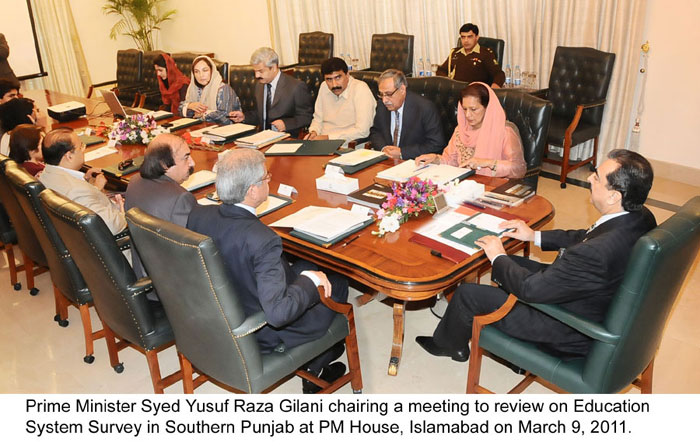PM for collective efforts to achieve education targets
ISLAMABAD, Mar 9 (APP): Prime Minister Syed Yusuf Raza Gilani Wednesday said that ‘Education For All’ is yet another challenge which requires collective efforts across the political and social divide for its attainment in the interest of our future generation and the larger interest of the country. Rational planning in this sector at different levels has to be done to achieve the desired literacy rate and ensure the quality of education, he added. The Prime Minister was chairing a special meeting on education system and planning in under-developed areas here at the PM House on Wednesday afternoon.
The Prime Minister said that the year 2011 had been declared as ‘Year of Education’ keeping in view the fact that education is central to the resolution of multiple challenges being faced by the country.
The Article 25-A of the Constitution enjoins upon the state to provide free and compulsory education to all children aged between 5 to 16 years which makes this task a shared responsibility of the Federal and the Provincial Governments.
The Prime Minister said that although education is specifically the responsibility of the Provincial Governments, it would be helpful that the recommendations prepared by the National Education Task Force be given due weightage by the Provinces in their Education Improvement Programmes.
He also impressed upon the National Education Task Force to develop a close coordination with the elected representatives of different areas particularly in the under-developed regions, both at the stage of collecting relevant data and preparing policies.
The Prime Minister stressed upon the need for preparing complete and accurate data of public and private educational institutions particularly in the under-developed areas of the country to help assess the needs of missing facilities and requirements of trained teachers.
He also called for developing some method for accountability of the performance of the educational institutions as well as the faculty / teaching staff at district level.
The targets for achieving literacy rate for each Tehsil, the Prime Minister said, needs to be fixed in order to achieve the Millennium Development goals by the year 2015.
This exercise, he added, might require regular inspection and monitoring of the progress of educational institutions particularly the schools.
In the same context, he mentioned that till the time various schools can be upgraded, the available school buildings of primary schools can be used for middle level classes in the afternoon and the same can be replicated at other levels.
He also suggested that special programmes need to be developed for teachers’ training and their capacity building in specialized subjects.
The Prime Minister said that after the 18th Amendment, education is precisely a provincial subject and the federal government would only extend policy guidelines.
He said the government prepared a comprehensive National Educational Policy 2009 in consultation with the federating units and other stakeholders.
This Policy has set the goals of raising the annual budgetary allocations for the sector to 7 percent of the GDP and increasing literacy to 85 percent by 2015. In this regard, focused attention of all the stake holders would be essential, he added.
Earlier, Begum Shahnaz Wazir Ali, Co-Chairperson of Pakistan Education Task Force through a Presentation briefed the Prime Minister on the state of education in the under-developed regions of the country including Southern Punjab.
While underlining the importance of education for national development, she emphasized that involvement of political and social leadership is essential to address the issue of illiteracy leading to miscellaneous challenges.
In her briefing, she mentioned that only 33% of children go to schools in various under-developed regions of the country. In most of these areas, she said the teacher-student ratio is imbalanced while the infrastructure / school buildings are either not available or inappropriate for proper schooling.
She also mentioned that the drop-out rate in the under-developed areas as well as in the rural areas of the country is quite higher after the primary education because of the economic conditions.
The meeting was also informed that 90 to 93% of the Budget allocated for the schools is spent on salaries and administrative expenditure leaving little margin for the improvement of conditions and development.
The reason for non-availability of teachers in these areas, it was mentioned, is that while the teachers get special allowance for working in main cities, no allowance is given to them for working in under-developed and rural areas. Therefore, despite availability of school buildings and upgradation of a number of schools, requisite teachers are not available.
It was also mentioned that the foreign assistance being received by various provinces is not enough as per requirement and secondly these are focused for buying text books and provision of missing facilities.



 10-03-2011 13:15:50
|


